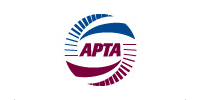
Washington, D.C. Summer has arrived and temperatures and fuel prices are rising. Gas prices are up 20 cents over last month, and up 32 cents over the past two months. While auto drivers are seeing their cost go up as temperatures rise, public transit commuters are staying cool and relaxed as they continue to see steady savings each month.
For instance this month, the annual savings for b riders is $9,524, according to the American Public Transportation Association’s (APTA) May Transit Savings Report. Individuals who ride public transportation instead of driving can also save, on average, more than $794 per month.
These savings are based on the cost of commuting by public transportation compared to the cost of owning and driving a vehicle which includes the May 27, 2015 average national gas price ($2.74 per gallon- reported by AAA), and the national unreserved monthly parking rate numbers.
APTA releases this monthly Transit Savings Report to examine how an individual in a two-person household can save money by taking public transportation and living with one less car.
The national average for a monthly unreserved parking space in a downtown business district is $166.26, according to the 2012 Colliers International Parking Rate Study, which is the most recent report available. Over the course of a year, parking costs for a vehicle can amount to an average of $1,995.
The top 20 cities with the highest public transit ridership are ranked in order of their transit savings based on the purchase of a monthly public transit pass. The savings also factor in local gas prices for May 27, 2015 and the local monthly unreserved parking rate.*
|
|
City |
Monthly |
Annual |
|
1 |
New York |
$1,348 |
$16,172 |
|
2 |
San Francisco |
$1,235 |
$14,819 |
|
3 |
Boston |
$1,189 |
$14,267 |
|
4 |
Chicago |
$1,113 |
$13,359 |
|
5 |
Philadelphia |
$1,112 |
$13,348 |
|
6 |
Seattle |
$1,101 |
$13,208 |
|
7 |
Los Angeles |
$1,089 |
$13,070 |
|
8 |
Honolulu |
$1,072 |
$12,859 |
|
9 |
San Diego |
$1,041 |
$12,496 |
|
10 |
Portland |
$1,000 |
$11,998 |
|
11 |
Minneapolis |
$985 |
$11,821 |
|
12 |
Baltimore |
$969 |
$11,627 |
|
13 |
Denver |
$967 |
$11,609 |
|
14 |
Washington, DC |
$947 |
$11,362 |
|
15 |
Pittsburgh |
$936 |
$11,237 |
|
16 |
Cleveland |
$928 |
$11,141 |
|
17 |
Las Vegas |
$908 |
$10,890 |
|
18 |
Atlanta |
$902 |
$10,825 |
|
19 |
Miami |
$901 |
$10,814 |
|
20 |
Dallas |
$888 |
$10,661 |
*Based on gasoline prices as reported by AAA on 5/27/15
Methodology
APTA calculates the average cost of taking public transit by determining the cost of the average monthly transit pass of local public transit agencies across the country. This information is based on the annual APTA fare collection survey and is weighted based on ridership (unlinked passenger trips). The assumption is that a person making a switch to public transportation would likely purchase an unlimited pass on the local public transit agency, typically available on a monthly basis.
APTA then compares the average monthly transit fare to the average cost of driving. The cost of driving is calculated using the 2014 AAA average cost of driving formula. That formula is based on variable and fixed costs. The variable costs include the cost of gas, maintenance and tires. The fixed costs include insurance, license registration, depreciation and finance charges. The comparison also uses the average mileage of a mid-size auto at 23.1 miles per gallon and the price for self-serve regular unleaded gasoline as recorded by AAA on May 27, 2015 at $2.74 per gallon. The analysis also assumes that a person will drive an average of 15,000 miles per year. The savings is based on the assumption that a person in a two-person household lives with one less car.
In determining the cost of parking, APTA uses the data from the 2012 Colliers International Parking Rate Study for monthly unreserved parking rates for the United States which is the most recent report available.
To calculate your individual savings, with or without car ownership, go to www.publictransportation.org.
About APTA
 To strengthen and improve public transportation, APTA serves and leads its diverse membership through advocacy, innovation and information sharing. APTA and its members and staff work to ensure that public transportation is available and accessible for all Americans in communities across the country.
To strengthen and improve public transportation, APTA serves and leads its diverse membership through advocacy, innovation and information sharing. APTA and its members and staff work to ensure that public transportation is available and accessible for all Americans in communities across the country.




Comments
There are no comments yet for this item
Join the discussion